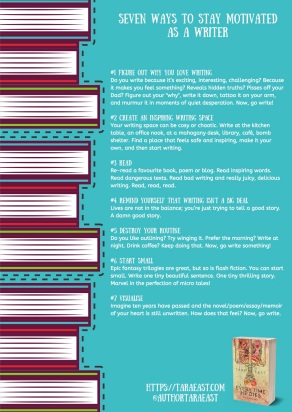If you’ve been following along these past few week’s then you already know that I am doing a series all about writing rules. I started off this series with Octavia Butler’s nine rules of writing, followed by Natalie Goldberg’s seven rules of writing, then Kurt Vonnegut’s eight rules of fiction writing, and two weeks ago I unpacked Steven King’s Twenty Rules of Writing Part One.

I want to preface this post by saying that there aren’t any real rules for writing other than the ones you decided on for yourself. I’m making this series as a means of inspiration and education so that you can take the advice that appeals to you, and leave the rest.
This week I’m continuing on with Stephen King’s TWENTY rules of writing by covering rules eleven to twenty.
Rule #11. There are two secrets to success
King attributes his success to staying physically healthy and staying married. While a literal reading of this statement won’t be applicable to everyone, the truth behind it is. Writing is not the most important thing in your life, people are, so you need to nourish those relationships. Writing is a solitary activity, but that doesn’t mean you have to live in solitude, tapping away at your keyboard until you finally kneel over. Take care of your relationships and your body, not so that you can write, but so that you can have a happy life.

Rule #12. Write one word at a time
This echoes Anne Lamont’s famous anecdote shared in her book, Bird by Bird. There are many ways to write a book, but ultimately when you boil it down to the barest of bones, novels are written word by word.
King urges aspiring writers to stay present, to focus on the scene at hand, and not to become distracted by thinking ahead.
Rule # 13. Eliminate distraction
This rule is timeless. While the form may change over time, I think we can all agree that distractions are one of the biggest killers to creativity, in fact, I’ve written a whole post about this that you can read here.
You’re not stupid. Switch off the internet, switch off your phone, close the curtains, close the door, and commit yourself to the story in front of you.

Rule #14. Stick to your own style.
Reading allows you to become familiar with the writing style of other authors, and while mimicking your favourite writer is a good place to start, eventually, aspiring writers need to develop their own voice and style.
The world already has a Stephen King, J.K Rowling, Lee Child, Toni Morrison, and Octavia Butler, but what it doesn’t have is you (and your voice).
Rule # 15. Dig.
Stephen King describes himself as a discovery writer: the story reveals itself to him as he is writing it. King believes that stories are ‘found things’, like fossils in the ground. He believes that the story already exist and that it is his job as the writer to slowly dig it up using the tools in his writerly tool belt. For him, writing is a practise of excavation where the story is uncovered through the act of writing it.

Rule # 16. Take a break.
Given that he’s published 70+ books, I’m not sure how good King is at taking his own advice, but nonetheless he does recommend that writers take breaks from their work so that they can see their story with fresh eyes.
There are a number of way to look at this rule: you can put a manuscript aside for a few months so that you are able to then edit it with an objective eye (King’s tactic), you can choose not to write on weekends, or you can incorporate mini-breaks into your writing sessions so that you avoid fatigue, eye strain, and the general discomfort that comes with sitting in a computer chair for long periods of time.
Rule # 17. Leave out the boring parts and kill your darlings.
This rule is pretty self-explanatory, but if there is a sentence, or a scene in your novel that is not revealing character, or moving the plot forward, or is otherwise dull, then it has got to go.
Rule #18. The research shouldn’t overshadow the story.
So many authors break this rule. If you’ve done extensive research for your novel, do not make your reader pay for this through lengthy info dumps or excessive description. Include the details that are interesting and that bring a scene to life, but remember that research is the backbone of the story – it’s not the story itself.

Rule # 19. You become a writer simply by reading and writing.
Writing workshops, classes, clubs, conferences, and craft books are valuable and you can learn A LOT (especially when starting out), but ultimately, the most valuable lessons you’ll learn are the ones you arrive at by yourself.
Reading and writing are the foundations of your craft.
Read well, by which I mean, think about what you are reading, look for the strings, dissect the work and consider what is working and what is not.
When editing your work, be sure to question your decisions. Does this scene really need to be here? Are my character’s believable? Is the dialogue interesting? Have I used too many adverbs?
Rule #20. Writing is about getting happy.
This is perhaps the best rule, we need to remember that writing is fun, or at least it’s supposed to be.
I can’t wrap this rule up any better than the King himself …
“Writing isn’t about making money, getting famous, getting dates, getting laid, or making friends. In the end, it’s about enriching the lives of those who will read your work, and enriching your own life, as well. It’s about getting up, getting well, and getting over. Getting happy, okay? Writing is magic, as much the water of life as any other creative art. The water is free. So drink.”
— Stephen King
GRAB A FREE COPY OF SEVEN WAYS TO STAY MOTIVATED AS A WRITER

While you’re here, be sure to join my email newsletter and gain instant access to your FREE downloadable copy of the Seven Ways to Stay Motivated as a Writer. Plus, you’ll receive my weekly newsletter straight to your inbox every Thursday morning. This is where I share links to my latest blog/vlog, updates and other exclusive content that I ONLY share via email.


Brilliant Tara. Thanks for the effort.
LikeLike
Hi Sophia, thanks for taking the time to comment. I am so glad you enjoyed the blog. Best of luck with your writing 🙂
LikeLike
This speaks to us all
You’re not stupid. Switch off the internet, switch off your phone, close the curtains, close the door, and commit yourself to the story in front of you.
LikeLike
So glad you’re enjoy this series, Mireya! Best of luck with your own writing. 🙂
LikeLiked by 1 person